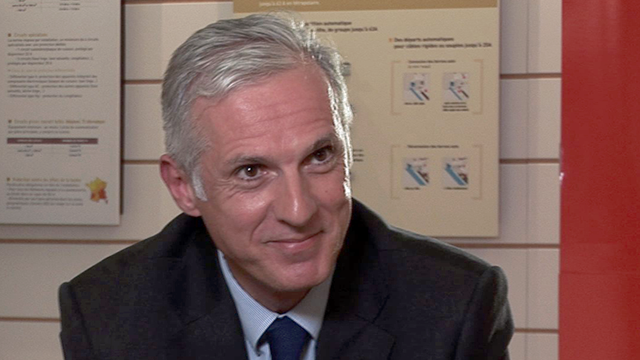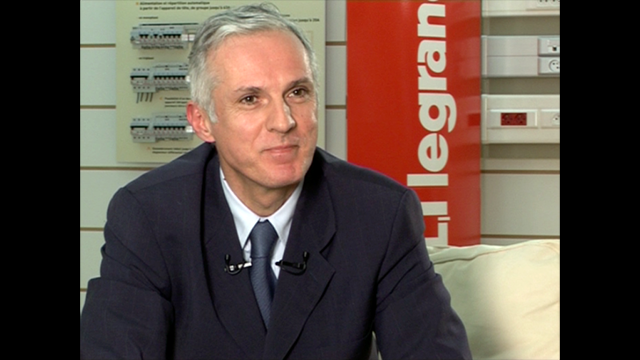EuroBusinessMedia (EBM): Legrand, the world leader in products for electrical installations and information networks, just reported full-year profit for 2007. Gilles Schnepp, welcome. You are the Chairman and CEO of Legrand, what are your comments on the company’s performance?
Gilles Schnepp (GS): Well the full-year performance for 2007 has been absolutely excellent, outstanding, because we’ve reached a 10.5 % in sales, but more important we have increased our margins by 100 basis points, reaching 17.5% for the adjusted operating margin. Cash flow has represented more than 13% of our sales in 2007 - so it’s more than half a billion euros - and our net income has increased by 67%, so you see that by all measures this is an absolutely excellent performance and we’re very satisfied about it.
EBM: The company has undergone some transformation in past quarters, you now claim to have a multi-polar structure. What does that mean exactly?
GS: Well, there are two ways to answer your question. First, geographically speaking, we have developed a number of positions throughout the world which now are becoming more and more important and which are creating a situation where we are less and less dependent upon one economy, one local situation. So, for instance, if we are talking about emerging markets, everybody talks about emerging markets, they represent 25% of our total sales - you know that emerging economies represent 21% of the world economies and at Legrand we have already 25% of our total sales in those regions - and they have increased by 18%, like for like in 2007. It’s a continuous, very rapid growth and we have leaderships in many of those countries - in Brazil, in Russia in China. So that’s the geographical part. Now, interestingly also we have developed a number of very fast growing markets, like for instance home systems, datacom, energy distribution - especially for the power segment - and a number of other segments which are growing very fast, typically 10%, 15%, 20%, like lighting control which is even above this at 24%. And those activities are less and less dependent upon local economies - because if we’re talking about energy efficiency, for instance, which is typically the driver for lighting control - this is the hot topic in town and not so much related to the building industry. So those two activities, geographical larger breakdown with a number of poles and a number of fast growing markets are creating a new business model for Legrand, more solid and growing faster.
EBM: Another transformation in the business model has been your move towards more marketing savvy, higher added value products, what you call trading-up. Where are you going with this strategy?
GS: Yes, you’re right to call it trading-up because that’s the way it works. Our idea is that if we invest in research and development, in marketing, in show rooms, in more sales people in the field, we can gradually increase the mix of our sales by adding more value, either aesthetic or functional value. Just to give you an example, you make like, if we can convince you, to switch from a traditional, white, plastic light switch to a metal, or wood or leather remote control or automatic scenario switch. Those shifts in demand are creating what we call the trading-up for Legrand. And this becomes extremely significant, because for instance if we take the example of our two main markets in Europe, France and Italy, almost one quarter - 23% exactly - of our growth in those two countries in 2007 are directly derived from this trading-up effect. So, typically home systems are the activities that benefit the most from the trading-up effect, but of course we are trying to deploy the same in all our ranges of products and in all geographies.
EBM: Obviously investors and the market in general are worried about the prospect of a recession in the US. What are your comments on the state of your US business today?
GS: Well, maybe let’s put things into perspective. Legrand’s activities in the US represent 15% of our total sales - and you know that the US economy represents more than 30% of the world economy - and actually our exposure to the residential market is only 35% of this 15%. So it means that it’s altogether 5% of the group sales which are exposed to the US residential market. So, you know, a rather small figure. Now, the comment I can make is that, even in 2007, where obviously the residential market was in a very difficult situation, we’ve been able, globally in the US, to show an increase in sales: 1.6%. And even actually higher growth in sales - above 4% - for the second part of the year which was the period during which the sub-prime crisis was at its peak. Why so? As a consequence of what I was saying a bit earlier, which is that we’ve been able, in the US – elsewhere as well but in the US also - to develop a number of high value added segments and fast growing segments like datacom, voice data image products under the brand of Ultronics, like home systems, Vantage - you may say home systems, but this is residential, yes, but the higher end of the residential market was in a good position at Legrand in 2007 in the US, and a few other segments, like lighting control for commercial applications, which is typically driven by energy efficiency and you know that energy efficiency is very popular worldwide as well as in the US. So altogether a very good resilience in the US in 2007.
EBM: And finally, what is your outlook for the full year 2008?
GS: Well the outlook for 2008 is the following: assuming no major upset in the economy, but taking into account the slowdown that everybody expects, we set ourselves the objective – and we are confident in our capacity to reach it - a sales increase of 7-9%. This 7-9% is to be understood excluding exchange rate but including acquisitions. As far as operating margins are concerned, our adjusted operating margin, which was 17.5% in 2007 if you remember, we set ourselves our objective to reach a level that is close to the one we have reached in 2007.
EBM: Gilles Schnepp, Chairman and CEO of Legrand, thank you very much.
GS: You’re welcome.



